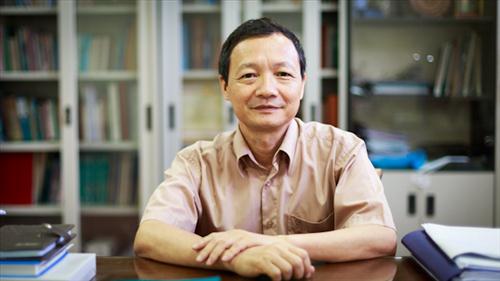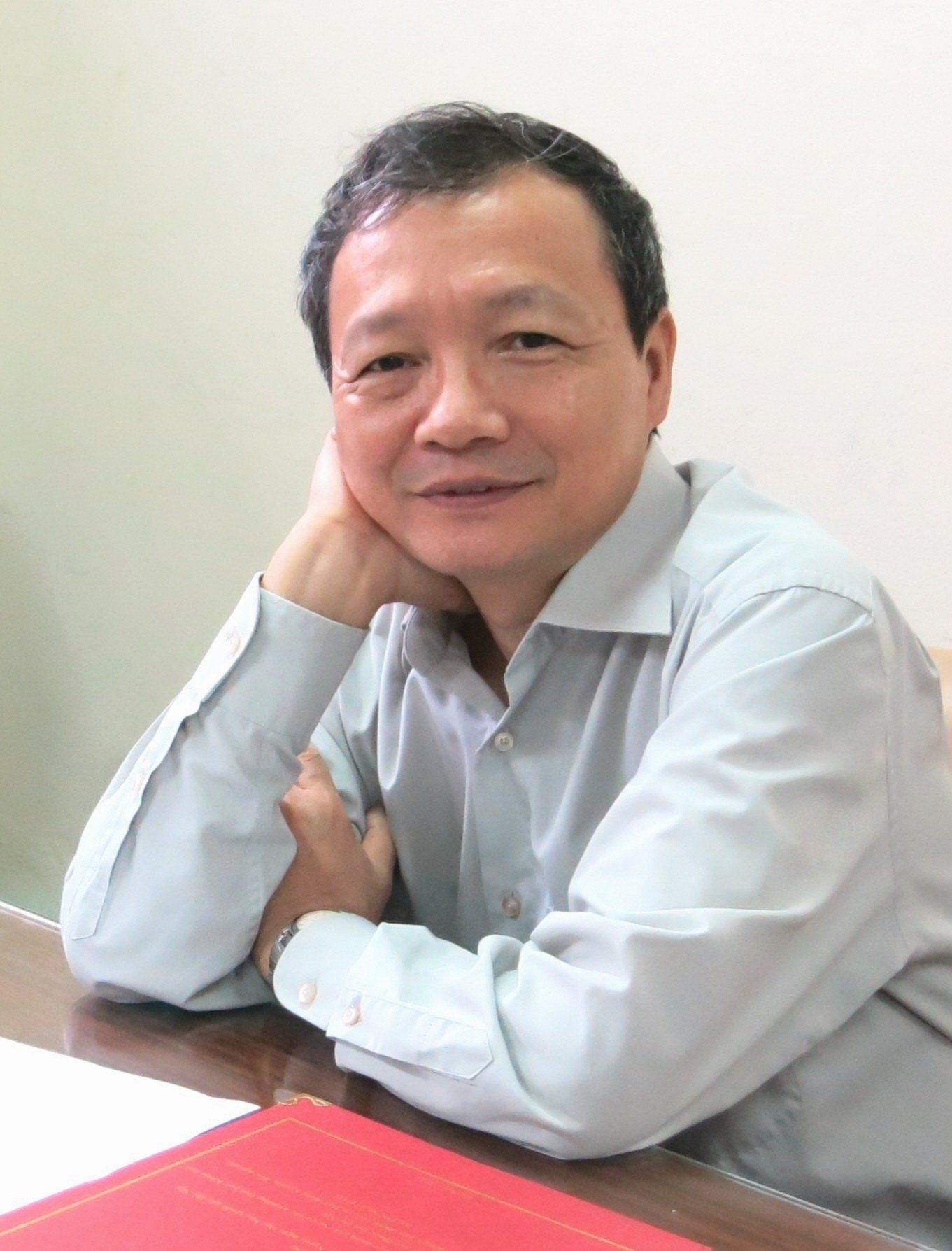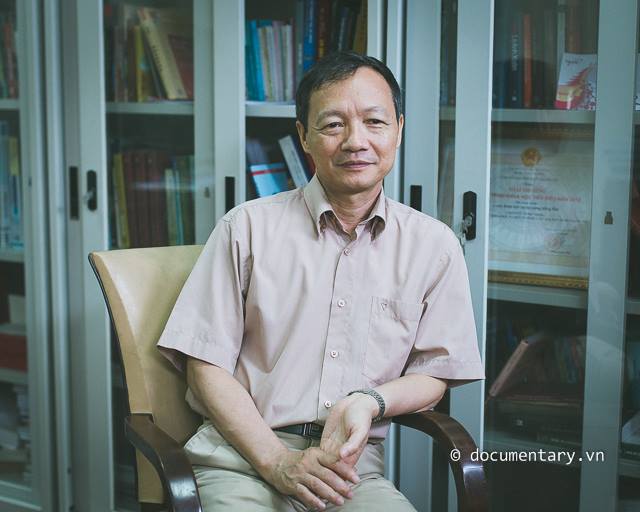
He was born in the year of the Horse (1954), I was born in the year of the Goat, one year after him and studied one year behind him at the Faculty of Literature, Hanoi University.
I consider being able to live alongside you, to be your friend, a great blessing in my life. At over sixty years old, I'm not afraid to say this. People live together, and one person is a mirror reflecting another's. Looking at a young grandchild, we relive our childhood. Looking at our teacher's life, we feel a pang of old age. Friends look at each other, and glean countless practical life lessons.
Sometimes, when we're chatting, I joke, "We have the same destiny, but you're Sa Trung Kim, while I'm Kim Trung Sa—that's more accurate."
I try every day, every hour, to learn his unwavering philosophy of life: "Strive for KINDNESS." That's all, yet it's so difficult. It's difficult, but it has to be that way.
We are a generation that is very well suited to poetry.Even country bumpkins can become intellectuals.Professor Vu Duc Nghieu was born into a Confucian-style family in the rural village of Giao Tien, Giao Thuy. A top student in Literature during his high school years in the then-famous Southern region, he was admitted to the Faculty of Literature, Hanoi University in 1972.

Professor, Doctor Vu Duc Nghieu
He was assigned to study Linguistics. The first class had only 21 students, enrolling at a time when the American bombing campaign was entering its most intense and decisive phase. From the evacuation site of Yen Phong, Hiep Hoa district, Ha Bac province, his friends, all from the countryside, gradually grew fond of "Grandpa" Nghieu – a small, pale man who occasionally played mischievous pranks on the girls in their tight-fitting clothes. Sometimes, "Grandpa" would use profound, ancient, and folk-like idioms that made everyone listen attentively and chuckle. At that time, few understood the deeper meaning of this field of study. It was all literature, after all; coming from the countryside, they followed whatever the organization assigned them to study. "We study for the revolution, brothers and sisters / We're hungry together for the revolution, no problem," they would often joke..
In class, the first thing every teacher taught was: "The storms and tempests are nothing compared to Vietnamese grammar." I thought they were just putting on a show, but it took me a lifetime studying linguistics to truly understand its logic. And even living two or three lifetimes might not fully grasp the meaning of that proverb, which is perhaps only a hundred years old.
Professor Vu Duc Nghieu was one of the few people of the older generation who quickly attained enlightenment in linguistics and was trusted by senior masters to pass on the scientific knowledge to them.
I began to witness this firsthand. In 1976, I met him at the water tank and asked, "What are you working on for your thesis?" "I'm working on a reverse dictionary." "What is that?" "It's not a forward dictionary."!”.“Are you saying it backwards?” “No! It’s copying it in reverse. For example, for EAT, you put N first, then Ă. Then you arrange them alphabetically to form a dictionary.” “What a waste of time!” “Just playing around!” My supervisor was Dr. Nguyen Duc Dan, a handsome mathematician and linguist who had returned from Poland and often played table tennis with me. To be honest, at the time I didn’t understand anything about that strange method, but I secretly admired that my supervisor had chosen the right student – meticulous, rigorous, and constantly struggling with research materials. And through him, I understood what K3 or K5 punched coupons were and secretly praised the Westerners for being far superior to us. Later, when we moved, we had three drawers containing about a cubic meter of coupons that we laboriously carried with us. I don’t know how many there were, but I joked, “Losing two months’ worth of oil coupons would be enough paper to cook rice.”
That reverse dictionary manuscript is still there (a full 70 bundles of seven-cent paper, crammed with handwritten notes two days ago). When I asked him why it hadn't been printed yet, he calmly replied, "I need to review its practical application in Vietnamese first." He's a perfectionist, while I pull it out to study whenever I need to compare and understand the style of ancient Vietnamese poetry, or to use it to debate rhyming and call-and-response in local poetry clubs. It's like a collection of books.transport bookIn the past, it was very convenient for locating and identifying rhymes and phonetics in poetry, something I needed when approaching an author's linguistic style.
It was the need for a theoretical foundation for his graduation thesis that, even during his student years, using his Russian language skills, he translated nearly 200 pages of material related to reverse dictionaries. This was something that not every student trained during wartime had the courage to do.
We lived together during the post-war period. We were incredibly poor. Looking back at photos from that time, everyone was as thin as if they had tuberculosis. This was the time when Professor Vu Duc Nghieu, with his rickety bicycle, would cycle 20 kilometers every night to and from Hanoi to study Nom script. He invited me, but I was lazy and didn't want to bother my friend's precious bicycle. I went to the Foreign Language School to learn a few French words and then "let the wind carry them away."
He went to school because someone had recognized his qualities: perseverance, carefulness, meticulousness, maturity, perfectionism, and a desire for self-improvement. That discerning teacher was Professor Nguyen Tai Can. However, he also spent some time hesitating between two paths: modern semantics or the historical philology of his two exceptionally rigorous and insightful mentors: Professor Can and Professor Dan. At that time, the professors had great faith and high expectations in the younger generation, so he had many advantages. I was interested in everything and everything. He, on the other hand, diligently translated (initially Russian) linguistic documents all day long, patiently compiling endless materials on vocabulary and historical grammar.
The first translations of my first year as a teacher are in this book.Introduction to the Doctrine linguisticsby Reformatskij. ThenUniversity Linguistics toughby Kasevich (mimeographed and published by the Linguistics Youth Union). When I read it at the time, I just thought: Mr. F. Saussure has already been chewing on it for years, so why create Mr. Kasevich? That's all.
The days and nights he spent researching the Nôm poetry of Nguyễn Trãi and Nguyễn Bỉnh Khiêm surprised me. But when the article...Regarding the poetic language of Nguyen Trai(1980) Sharing the same name as Professor Nguyen Tai Can, I only realized this when I participated in the Linguistics conference. Before that, I had worked on Nguyen Trai, but focusing on his ideology. Reading his article, I became aware of the unparalleled value of linguistic knowledge when approaching literary texts. I became even more fascinated with linguistics from then on.
From then on, university professor Vu Duc Nghieu quickly established himself as a teacher and was soon trusted to teach at many different schools: the Faculty of Literature and Linguistics at the University of Hanoi, the Faculty of Foreign Languages at the Military University, the Police University, the Political Officer School, the Central Propaganda School… Not all young people possess such ability. He was young, spoke seriously, and sometimes even sternly. Students both admired and feared him. By the age of twenty-five, everyone was calling him "Grandpa Nghieu."
Professor Vu Duc Nghieu's scientific writings at that time (1980-1983), though not numerous, were slow but steady, quickly shaping a research style oriented towards scholarly study: speaking with evidence and facts, using precise terminology, logical arguments, being concise and compact, and effectively and decisively addressing a matter or issue.

He was the Deputy Head of the Faculty of Linguistics (1996 - 2000), and the Vice Rector of the University of Social Sciences and Humanities (2003-2014) / Photo: Thanh Long
Instead of competing to study abroad, he enrolled in a domestic postgraduate program. He struggled to make ends meet while also working on his doctoral dissertation.These words are historically related to each other in terms of meaning and consonants. head in VietnameseIt was a seemingly narrow topic, but one that demanded a deep understanding of phonetics, grammar, vocabulary, and historical semantics. At this time, his former teacher, Professor Nguyen Duc Dan, had moved to Saigon and was also passionate about "semantic fields," with concise articles published in journals.Today's knowledgeandNew WorldAlthough far apart, the two of them would chat intimately whenever they met. His thesis supervisors were two highly respected professors in the field of linguistics: Professor Le Quang Thiem and Professor Nguyen Thien Giap, who were both like mentors and brothers, and also colleagues. Professor Nguyen Tai Can provided him with materials from his home and guided him through the library, which he spent countless hours copying by hand.
Just when we thought things were going smoothly, he had to go to Phnom Penh to teach Vietnamese—what we called "going to the front lines as a civilian worker." He took his documents with him and used the time to write his thesis under a mosquito net. While others were trading goods to earn a few dollars, he painstakingly read and wrote. Everywhere he went, he would ask locals about words and phrases, then take notes and compare them. At night, when the power went out, he would brag about the origins of words and argue with them. It was tough, but fun. But basically, after eight months, the manuscript was finished, and he returned to Vietnam to defend it. He was on par with his friends in that respect.
At this time, with his established scientific reputation, he was invited to teach for three consecutive years at Cornell University's Department of Modern Languages and Linguistics. One day, while helping him whitewash and clean his second-floor room, I noticed a few thin sheets of paper clipped to a paperclip that had fallen out. Picking it up, I exclaimed, "These are letters from Mr. Diffloth!" He took them and said, "Oh! No, they're not letters. They're comments from the professor and another gentleman! I almost died, and it would be such a shame to lose them! They're handwritten notes!" Instead of writing them down, I quoted them.
Cornell University…. 21 April 93.
From G. Diffloth.To Language Committee.
“Nghia is a talented teacher, appreciated by students and open to suggestions”… “This is absolutely invaluable to our students and will serve them in their future endeavors having to do with Vietnamese” (Nghiệu is a talented lecturer, open to sharing his opinions and highly regarded by his students... This is incredibly valuable to our students and it will help encourage them to strive to learn Vietnamese..
From J. Wheatley. To G. Diffloth.
“Nghieu is extremely competent and conscientious teacher…. I found him the best Vietnamese teacher I have even worked with. He is very aware of nuances; he thinks up wonderful conversational material” (Nghieu is an extremely competent, dedicated, and thoughtful instructor... I realize that he is the best Vietnamese language instructor I have ever worked with. He is very aware of the subtle nuances in teaching the language and creates excellent conversational materials..
The two letters they submitted to their department head also contained positive evaluations and plans for scientific collaboration. This was clearly not "diplomatic" language, as it was internal communication. The department head was delighted and immediately gave them to him. Each opinion filled an entire A4 page. Having such a keepsake was truly reassuring.
He couldn't escape his managerial responsibilities. First, he became the Deputy Head of the Linguistics Department. In 2000, Associate Professor Pham Quang Long, then Vice Rector and Party Secretary of the University of Humanities, told me: "Nghieu has returned from America, he has a bit of influence now, he should participate in management with the team. You should try to persuade him a little." He then became Head of the Scientific Research Department and later Vice Rector of the University of Social Sciences and Humanities for more than two consecutive terms.
His office at school was like a specialized library corner, where he both managed his studies and prepared for his future dissertation. That was his work.A brief history of vocabulary VietnameseIn 2011, articles continued to be published regularly. Joint and individual scholarly books were also published; in 2014-2015 alone, there were three.
Returning to his professional work in the Department of Linguistics was a blessing for him. "It suits me and it brings peace," he said.
Professor Vu Duc Nghieu is following in the footsteps of the pioneering generations who came before him, becoming a profound and serious Vietnamese linguistics researcher, forever passionate about the demanding and demanding profession he has dedicated himself to.
Once again, sipping his tea, he repeated, "We've always strived for kindness, sir!"
|
PROFESSOR, DR. VU DUC NGHIỆU
Faculty of Literature, Hanoi University. Department of Linguistics, University of Social Sciences and Humanities.
Deputy Head of the Department of Linguistics (1996 - 2000). Head of Science Department (2000 - 2002). Vice Rector of the University of Social Sciences and Humanities (2003-2014). Head of the Department of Comparative Linguistics (2009 to present).
|
Author:Nguyen Hung Vy